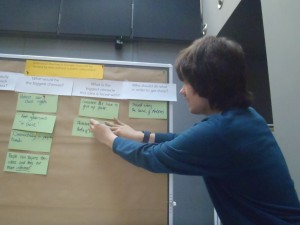After over a year since my exchange trip to Salamanca, where I previously wrote about my experiences for Youth Employment UK, it is dispiriting to report of Europe’s continuing woes of youth unemployment figures in 2015. As young people seek long-lasting solutions to the challenges across the continent, I made a trip to Berlin which brought together over 20 people aged under-30 from the EU to address some
of the topical issues decided by over 4,000 participants.
As news headlines stand, the current situation is showing no strong signs of improvement. According to one article, youth unemployment as a whole has hit a 33 year high and in Italy alone, 44% of its young people are classed as unemployed. It has the makings of a lost generation, with a high risk that the problems will later affect other young people as they enter an uncertain future.
The ‘Europe can do Better’ project, hosted by the Change Centre Foundation in Germany, explored these issues, plus those surrounding: government debt, immigration, the economy, security and the environment as the most pressing challenges for young people in the UK, Spain, Germany and Poland. This determined the selection of participants of the Roundtable. Interestingly, unemployment was the most important topic, with 56% of those who took part in survey research indicating as such.
During a course of intense discussions on twenty-four possible solutions, hosted in the modern facilities at Microsoft, only three could be decided collectively as the possible contenders for recommendation. One of those preferred most included:
Large and medium-sized companies should be obliged to have a minimum quota of young employees with less than three years of work experience. This would help young professionals start their careers.
Going by feedback, there was approval of the proposal. Participating countries seemed to agree on the whole, with 74% of all age groups feeling it could be achieved. For those aged 20-30, it was even higher, with the figure at 80%.
The merits might be obvious, such as ending the vicious cycle of ‘no work experience, no employment’ and a greater balance of young employees in the workplace, but the quality of the experience, not just in a wage respect, but also development of the young person needs to be assured. As shown by the lacklustre performance so far of the EU’s ‘Youth Guarantee’, and the lack of enforcement powers and difficult economic situations of countries such as Spain and Greece, nation states would need to be responsible for their own support of the initiative, alongside employers themselves.
Having only heard of Berlin, and Germany’s, apparent economic success on news coverage before, it was clear to see from my visit they too have pockets of deprivation, as much as that of the UK. In one study, it revealed that young Germans are significant victims when unemployed for the long-term. A solution is still possible, but only if, as YEUK believe, that youth voice and involvement of young people in those decisions are an integral part of any process of chang













